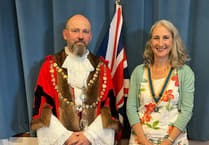Okehampton’s independent businesses have given mixed responses to last month’s news that Okehampton Town Council will continue research into establishing a BID (Business Improvement District) in the town centre.
The announcement of the council’s decision in October sparked debate among the town’s residents and smaller businesses, which were not consulted in the initial research, as the next stage of BID research is set to begin.
Small business owner Rebecca Green said that she could see potential in the idea but noted that the management of the district and the inclusion area would need to be looked at carefully in order for a BID to be truly successful.
She added: ‘I am keeping an open mind. If it’s set up right, it’s got to give smaller businesses a voice but I don’t think they should be forced to pay — businesses have been hit hard.
‘But what the researchers need to be careful of is to ensure that the geographical area of the BID encompasses the whole town and not just a bit of the high street. The businesses outside the BID area might end up opposing it.
‘There is already a business owners’ group in Okehampton so what would be really lovely is if those responsible for setting up the BID put as much energy into the business projects already running. I’m apprehensive but not against the idea.’
Concerns were also raised over the timing of an Okehampton BID, which requires ratepayers to pay a small levy, when many businesses are already struggling to balance the books as a result of the cost-of-living crisis.
Mark Turner, the proprietor of Donalds Menswear, said: ‘I think it’s probably a good idea. It would ensure there’s a pot of money to collectively put forward for town events and it means it’s fair for everyone - everyone puts into it, including the big businesses which don’t often get involved.
‘Obviously money is tight so the timing is not great so I’m not sure at the moment. We don’t know how it will turn out though the levy is not a big contribution -– usually only 1-1.5 percent of the rateable amount – but some businesses will find that difficult.’
At an extraordinary meeting last month, town councillors decided to continue research into a BID with the help of an independent contractor and West Devon Borough Council, and also offered to cover 50 percent of the cost for the next stage of the research.
The initial BID study focused on Okehampton’s largest businesses including Waitrose, Co-op and Lidl, which registered their interest in the possibility of a BID, as they would be the main investors in the improvement district.
The research also concluded that the levy rate was likely to range between 1.25 per cent and two per cent of rateable value (the value of a property) and bring in between £60,000-£130,000 to the town.
However, the next stage of research will include discussions with smaller business owners to gauge their support for the idea as the research consultants noted that a BID could not be successfully established without their support.
Okehampton previously attempted to set up a BID in 2013 but the proposal failed due to opposition from smaller businesses. At that time, the town used to have a Chamber of Trade which has now disbanded, and was cited by some councillors at last month’s meeting as another one of the main reasons why the attempt failed.
BIDs were started in Canada in the 1970s as a way to improve town centres following a rise in decentralisation as families increasingly moved into the town suburbs.
The idea quickly spread to the United States and was then introduced into Britain by the UK government in the early 2000s. Today there are over 300 BIDs across the UK, including one in Tavistock.
Tavistock’s BID has been particularly successful and brought in approximately £80,000-£85,000 to the town’s business district and helped fund Dickensian Evening and the Christmas lights.




-charity-shop-on-West-Street-in-Okehampton.jpeg?width=209&height=140&crop=209:145,smart&quality=75)
Comments
This article has no comments yet. Be the first to leave a comment.